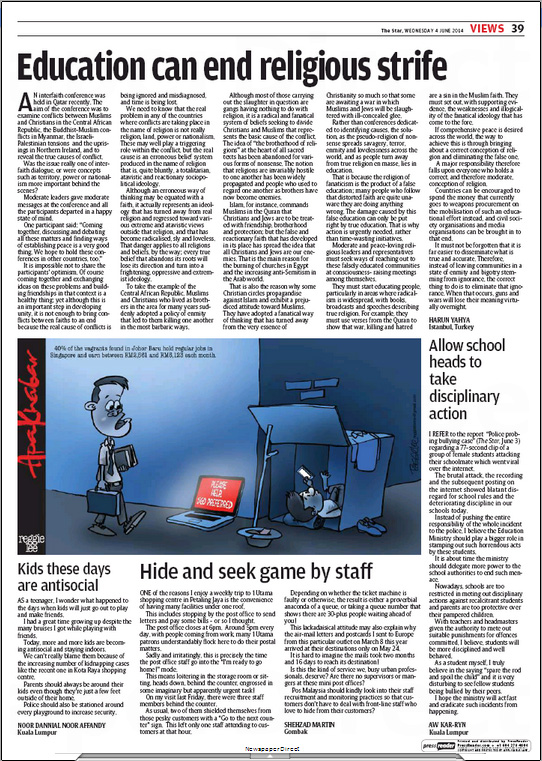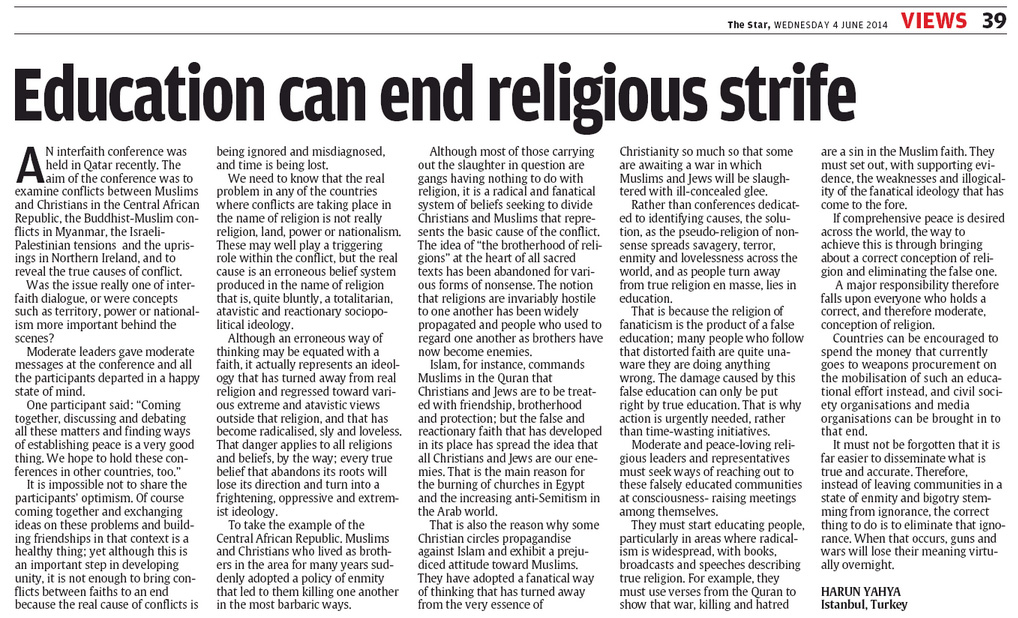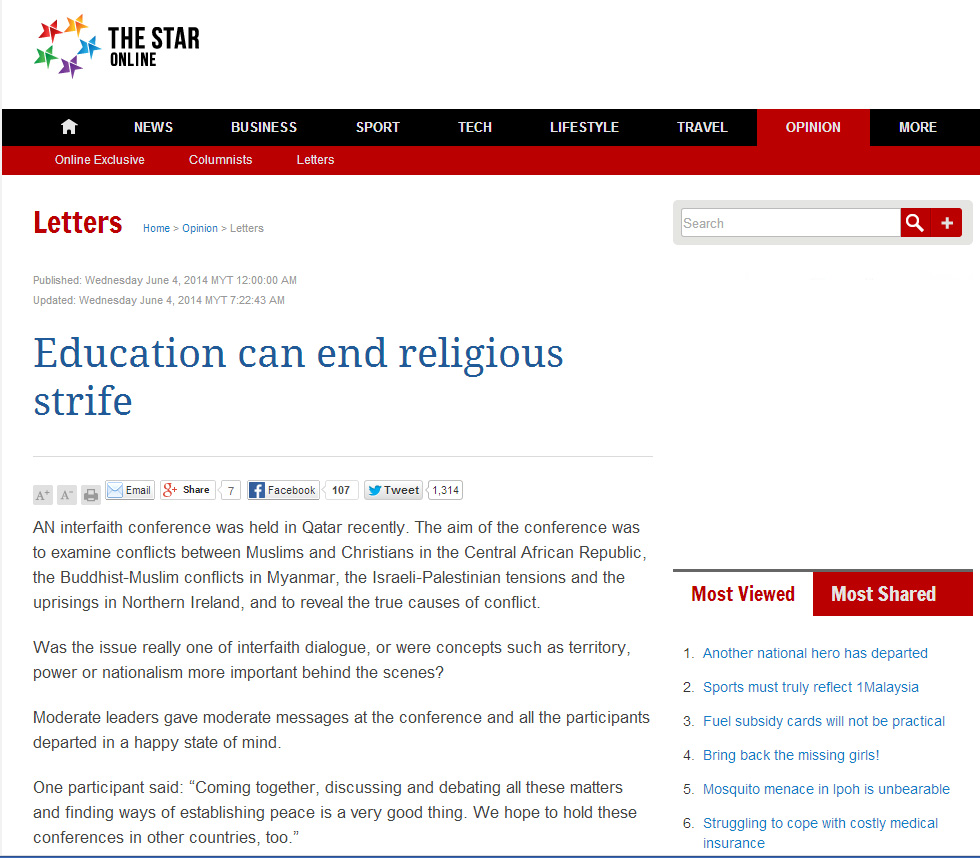
A conference on interfaith dialogue at which important issues were raised was held in Qatar recently. The aim of the conference was to examine conflicts between Muslims and Christians in the Central African Republic, the Buddhist-Muslim conflicts in Myanmar, the Israeli-Palestinian tensions and the uprisings in Northern Ireland, and to reveal the true causes of conflict. Was the issue really one of interfaith dialogue, or were concepts such as territory, power or nationalism more important behind the scenes?
Moderate leaders gave moderate messages at the conference where these matters were considered, and all the participants departed in a happy state of mind. One participant said, “Coming together, discussing and debating all these matters and finding ways of establishing peace is a very good thing.” She then added, “We hope to hold these conferences in other countries, too.”1
It is impossible not to share the participants’ optimism. Of course coming together and exchanging ideas on these problems and building friendships in that context is a healthy thing; yet although this is an important step in developing unity, it is not enough to bring conflicts between faiths to an end because the real cause of these conflicts is being ignored and misdiagnosed, and time is being lost.
We need to know that the real problem in any of the countries where conflicts are taking place in the name of religion is not really religion, land, power or nationalism. These may well play a triggering role within the conflict, but the real cause is an erroneous belief system produced in the name of religion that is, quite bluntly, a totalitarian, atavistic and reactionary sociopolitical ideology.
Although an erroneous way of thinking may be equated with a faith, it actually represents an ideology that has turned away from real religion and regressed toward various extreme and atavistic views outside that religion, and that has become radicalized, sly and loveless. That danger applies to all religions and beliefs, by the way; every true belief that abandons its roots will lose its direction and turn into a frightening, oppressive and extremist ideology.
To take the example of the Central African Republic, Muslims and Christians who lived as brothers in the area for many years suddenly adopted a policy of enmity that led to them killing one another in the most barbaric ways. Although most of those carrying out the slaughter in question are gangs having nothing to do with religion, it is a radical and fanatical system of beliefs seeking to divide Christians and Muslims that represents the basic cause of the conflict. The idea of “the brotherhood of religions” at the heart of all sacred texts has been abandoned for various forms of nonsense. The notion that religions are invariably hostile to one another has been widely propagated and people who used to regard one another as brothers have now become enemies.
Islam, for instance, commands Muslims in the Qur’an that Christians and Jews are to be treated with friendship, brotherhood and protection; but the false and reactionary faith that has developed in its place has spread the idea that all Christians and Jews are our enemies. That is the main reason for the burning of churches in Egypt and the increasing anti-Semitism in the Arab world.
That is also the reason why some Christian circles propagandize against Islam and exhibit a prejudiced attitude toward Muslims. They have adopted a fanatical way of thinking that has turned away from the very essence of Christianity so much so that some are awaiting a war in which Muslims and Jews will be slaughtered with ill-concealed glee.
Rather than conferences dedicated to identifying causes, the solution, as the pseudo-religion of nonsense spreads savagery, terror, enmity and lovelessness across the world, and as people turn away from true religion en masse, lies in education. That is because the religion of fanaticism is the product of a false education; many people who follow that distorted faith are quite unaware they are doing anything wrong. The damage caused by this false education can only be put right by true education. That is why action is urgently needed, rather than time-wasting initiatives.
Moderate and peace-loving religious leaders and representatives must seek ways of reaching out to these falsely educated communities at consciousness- raising meetings among themselves. They must start educating people, particularly in areas where radicalism is widespread, with books, broadcasts and speeches describing true religion. For example, they must use verses from the Qur’an to show that war, killing and hatred are a sin in the Muslim faith. They must set out, with supporting evidence, the weaknesses and illogicality of the fanatical ideology that has come to the fore.
If comprehensive peace is desired across the world, the way to achieve this is through bringing about a correct conception of religion and eliminating the false one. A major responsibility therefore falls upon everyone who holds a correct, and therefore moderate, conception of religion. Countries can be encouraged to spent the money that currently goes to weapons procurement on the mobilization of such an educational effort instead, and civil society organizations and media organizations can be brought in to that end. It must not be forgotten that it is far easier to disseminate what is true and accurate. Therefore, instead of leaving communities in a state of enmity and bigotry stemming from ignorance, the correct thing to do is to eliminate that ignorance. When that occurs, guns and wars will lose their meaning virtually overnight.
1. http://www.aljazeera.com/programmes/insidestory/2014/03/religion-source-unity-division-2014327161222765229.html
Adnan Oktar's piece on The Star:
http://www.thestar.com.my/Opinion/Letters/2014/06/04/Education-can-end-religious-strife/




